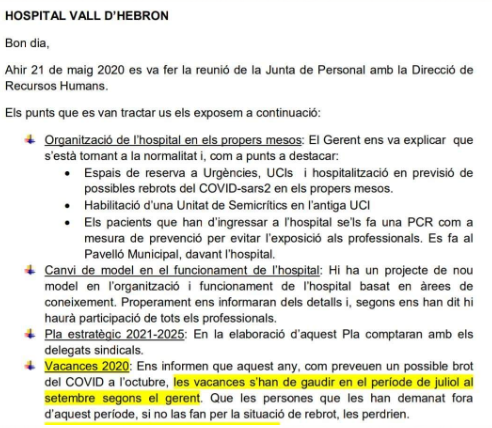- Direct: everything about the coronavirus
Catalonia is progressing in the de-escalation, sowing shrouded in uncertain episodes and indicators. Last Friday, 635 unknown deaths emerged, while the Government authorized the passage from Barcelona to Phase 1. On Tuesday, reports from the Ministry of Health confirmed that the autonomous community is among the least PCR tests carried out in primary care - a 21% -, despite being the first and most important link in the chain of detection of new cases of coronavirus. And that same day the Generalitat admitted that Lérida could not go to Phase 2 after detecting an outbreak in several slaughterhouses and an illegal party. To all those ingredients was added on Wednesday a new bag of 277 new deceased not reported to date.
All these episodes have put the Catalan Government on alert, which has begun to implement a new and more exhaustive protocol for tracking new infections for fear of outbreaks.
The last update of the "Procedure for dealing with cases of infection with the new coronavirus in the deconfusion phase" was approved on May 24 - a day before Barcelona entered Phase 1- and states that "at the time In which a suspicious case is detected, all its close contacts will be detected from 48 hours before the diagnosis or onset of symptoms. The protocol, to which EL MUNDO has had access, defines a "narrow case" as "any person who has been in the same place as a confirmed case at a distance of less than two meters for at least 15 minutes ", which enlarges enormously the number of people to track with each contagion. They include "cohabitants, visits and other types of sporadic, sexual contacts, leisure companions ...".
The manual also defines as close contact of an infected person "the passengers located within a two-seat radius of the case and the crew that has had contact, on long-distance journeys by plane or train or other means of transport."
All close contacts of those infected should start within a "ideal" period of 24 hours from detection, quarantine and isolation for 14 days, in which they should report any symptoms compatible with Covid-19 and "avoid taking antipyretic drugs without supervision. medical so as not to mask and delay the onset of fever ».
In parallel to its new tracking strategy, the Generalitat has also decided to limit the vacations of its toilets. Large hospitals such as the Vall d'Hebron will push their doctors and nurses to enjoy their vacation break between the months of July and September "due to a possible Covid outbreak in October". This was notified by the hospital's Human Resources Directorate to the Staff Board at a meeting held on May 21, according to the internal circular to which this newspaper has had access. "People who have requested vacations outside this period, if they do not do it due to regrowth, would lose them, " warns the statement sent to the health workers.
Also the Sant Joan de Déu hospital - where Barcelona deliveries during the pandemic have been centralized - forces its health workers to take vacations between June 1 and September 15 "in anticipation of a possible outbreak in the months from October to December ”, according to a statement from the Management Committee of the hospital center that this newspaper has accessed.
In accordance with the criteria of The Trust Project
Know more- Barcelona
- Catalonia
- Coronavirus
Descaling Agglomerations and prohibited activities in the opening of the beaches of Barcelona
Descaled Quim Torra condemns Barcelona to being the only great city that remains isolated due to the Covid-19 crisis
Covid-19The Generalitat admits companies that must return to activity without health guarantees against coronavirus

